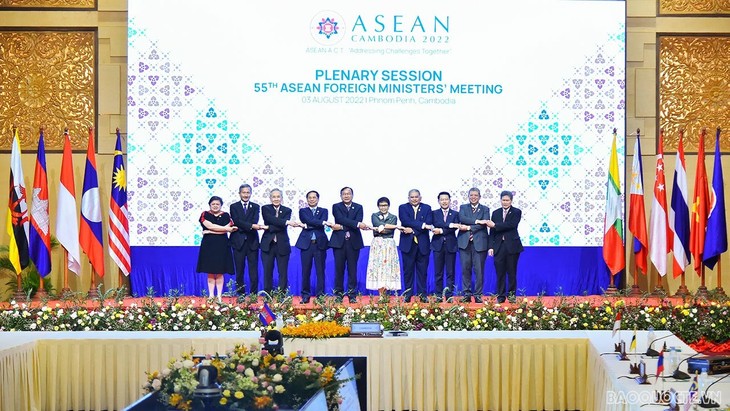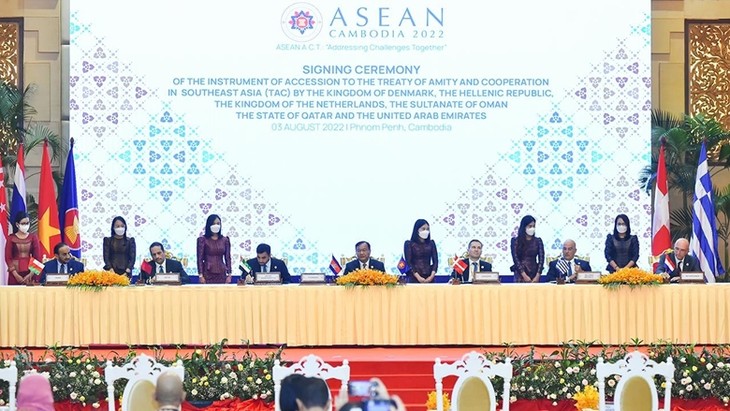(VOVWORLD) -The ongoing 55th ASEAN Foreign Ministers Meeting (AMM-55) has affirmed the Association’s determination to uphold responsibility and maintain its solidarity and centrality in cooperation and peace building.
 ASEAN Foreign Ministers pose for a group photo at the opening session of the 55th ASEAN Foreign Ministers' Meeting (AMM-55) in Phnom Penh, Cambodia, August 3. Photo: Tuan Anh ASEAN Foreign Ministers pose for a group photo at the opening session of the 55th ASEAN Foreign Ministers' Meeting (AMM-55) in Phnom Penh, Cambodia, August 3. Photo: Tuan Anh
|
At their meeting in Phnom Penh, Cambodia, this week, ASEAN foreign ministers, in a spirit of “Addressing Challenges Together”, emphasized regional cooperation and joint response to regional and global uncertainties.
ASEAN's viewpoints
ASEAN countries have made clear their global stance: not to take sides and only favor ASEAN's interests. ASEAN wants its partners to make full use of the advantages brought by partnerships and work with ASEAN to build a community and strive for peace, stability, and shared prosperity.
ASEAN’s partners put forth extensive and diverse cooperation measures to help ASEAN build community, accelerate recovery, and move towards sustainable development. These initiatives entail trade, inter-regional connectivity, gap narrowing, innovation, digital transformation, energy, and climate change response. Partner countries have also worked with ASEAN in healthcare, maritime security, counter-terrorism, transnational crime prevention, and cyber security.
In the face of emerging issues, ASEAN foreign ministers once again affirmed their unwavering stance on the East Sea, Myanmar, Ukraine, the Korean Peninsula, and tensions between major countries. ASEAN called on all parties to uphold international law, the UN Charter, the 1982 UN Convention on the Law of the Sea (UNCLOS) and the Treaty of Amity and Cooperation in Southeast Asia (TAC). They said countries and parties need to maintain dialogue, build trust, make peace the goal and cooperation the tool, respect the rule of law, exercise restraint, and avoid turning disagreements into conflicts.
ASEAN outlined its activities to implement the 5-point consensus on Myanmar and progress on developing a Code of Conduct (COC) that will make the East Sea (internationally known as the South China Sea) a sea of peace, stability, cooperation, and development.
ASEAN’s statement on developments in the Taiwan Strait voiced concern about the risk of instability and grave, unpredictable consequences for the region. The statement called for maximum restraint, and adherence to the principles of the UN Charter and the TAC. ASEAN countries reaffirmed their support for the “One China” policy, upholding cooperation, peaceful coexistence, and healthy competition.

The signing ceremony of the Treaty of Amity and Cooperation's extension document for Denmark, Greece, the Netherlands, Oman, the United Arab Emirates, and Qatar. Photo: dangcongsan.vn
|
ASEAN persists in unity
ASEAN is an indispensable partner in high-level multilateral forums in the region and its centrality is respected. ASEAN and its dialogue partners – the US, China, Russia, Japan, the Republic of Korea, India, Australia, and New Zealand – have established a bilateral summit dialogue (ASEAN+1). At the ASEAN-US Summit in mid-May, President Joe Biden called it a historic event which will open up a new era in their relations. President Biden reaffirmed his commitment to support and respect ASEAN’s centrality and to work with ASEAN to raise their partnership to a new level and jointly address challenges arising in the region.
ASEAN-led mechanisms such as the ASEAN Regional Forum (ARF), ASEAN+3 Cooperation, the East Asia Summit (EAS), the ASEAN Defense Ministers' Meeting Plus (ADMM+), and the expanded ASEAN Maritime Forum (EAMF) all saw the participation of countries with interests in the region.
The principle of consensus has played a leading role in ASEAN’s formation and development and been a key foundation of the Association's cooperation over the past decades. An ASEAN of consensus is a solid bloc and a driving force for regional and inter-regional cooperation. AMM 55 continues to uphold its responsibilities and maintain solidarity and centrality in cooperation and peacekeeping.